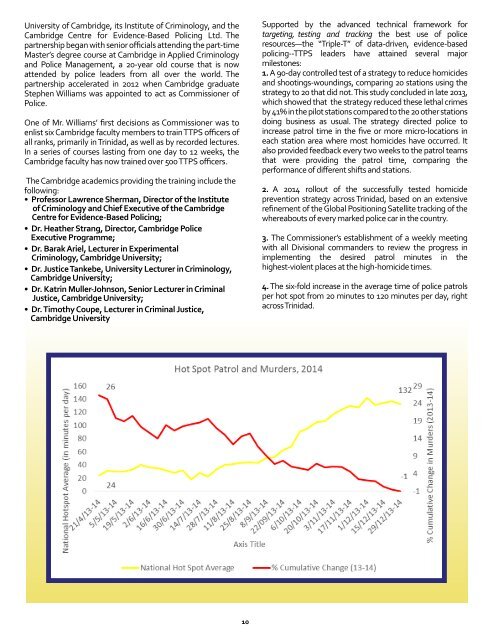You also want an ePaper? Increase the reach of your titles
YUMPU automatically turns print PDFs into web optimized ePapers that Google loves.
University of Cambridge, its Institute of Criminology, and the<br />
Cambridge Centre for Evidence-Based Policing Ltd. The<br />
partnership began with senior officials attending the part-time<br />
Master’s degree course at Cambridge in Applied Criminology<br />
and Police Management, a 20-year old course that is now<br />
attended by police leaders from all over the world. The<br />
partnership accelerated in 2012 when Cambridge graduate<br />
Stephen Williams was appointed to act as Commissioner of<br />
Police.<br />
One of Mr. Williams’ first decisions as Commissioner was to<br />
enlist six Cambridge faculty members to train <strong>TTPS</strong> officers of<br />
all ranks, primarily in Trinidad, as well as by recorded lectures.<br />
In a series of courses lasting from one day to 12 weeks, the<br />
Cambridge faculty has now trained over 500 <strong>TTPS</strong> officers.<br />
The Cambridge academics providing the training include the<br />
following:<br />
• Professor Lawrence Sherman, Director of the Institute<br />
of Criminology and Chief Executive of the Cambridge<br />
Centre for Evidence-Based Policing;<br />
• Dr. Heather Strang, Director, Cambridge Police<br />
Executive Programme;<br />
• Dr. Barak Ariel, Lecturer in Experimental<br />
Criminology, Cambridge University;<br />
• Dr. Justice Tankebe, University Lecturer in Criminology,<br />
Cambridge University;<br />
• Dr. Katrin Muller-Johnson, Senior Lecturer in Criminal<br />
Justice, Cambridge University;<br />
• Dr. Timothy Coupe, Lecturer in Criminal Justice,<br />
Cambridge University<br />
Supported by the advanced technical framework for<br />
targeting, testing and tracking the best use of police<br />
resources—the “Triple-T” of data-driven, evidence-based<br />
policing--<strong>TTPS</strong> leaders have attained several major<br />
milestones:<br />
1. A 90-day controlled test of a strategy to reduce homicides<br />
and shootings-woundings, comparing 20 stations using the<br />
strategy to 20 that did not. This study concluded in late 2013,<br />
which showed that the strategy reduced these lethal crimes<br />
by 41% in the pilot stations compared to the 20 other stations<br />
doing business as usual. The strategy directed police to<br />
increase patrol time in the five or more micro-locations in<br />
each station area where most homicides have occurred. It<br />
also provided feedback every two weeks to the patrol teams<br />
that were providing the patrol time, comparing the<br />
performance of different shifts and stations.<br />
2. A 2014 rollout of the successfully tested homicide<br />
prevention strategy across Trinidad, based on an extensive<br />
refinement of the Global Positioning Satellite tracking of the<br />
whereabouts of every marked police car in the country.<br />
3. The Commissioner’s establishment of a weekly meeting<br />
with all Divisional commanders to review the progress in<br />
implementing the desired patrol minutes in the<br />
highest-violent places at the high-homicide times.<br />
4. The six-fold increase in the average time of police patrols<br />
per hot spot from 20 minutes to 120 minutes per day, right<br />
across Trinidad.<br />
10


